Baume-les-Dames to Vaire-le-Grand
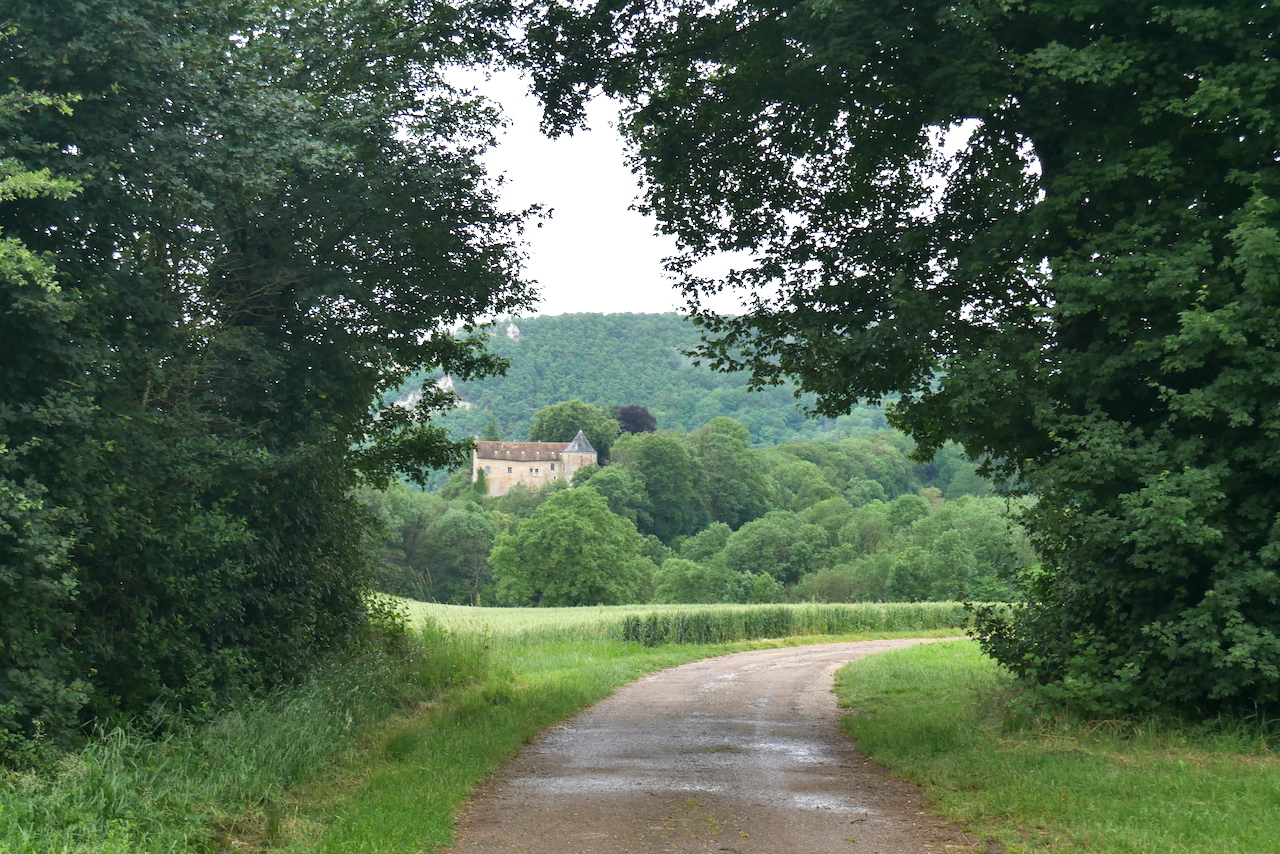
Bourgogne-Franche-Comté
4. Baume-les-Dames to Vaire-le-Grand
Medium
7h
26,2km
+1177m
-1195m
Step
Embed this item to access it offline
You leave Baume-les-Dames by crossing the Doubs and take a little altitude by the coast of Aucroix. Walk in the forests overlooking the Doubs valley and go down into the valley to cross the Doubs at Ougney and climb the hill on the right bank. On the plateau take a look at the Château du Petit-Roulans (private property not to be visited) before climbing to the chapel of Aigremont. Descend into the valley at Deluz to go up the plateau and arrive at Vaire-le-Grand on the left bank of the Doubs.
7 points of interest
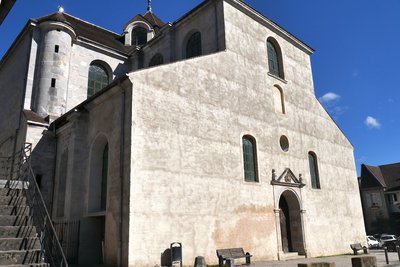
Façade de l’église abbatiale Notre-Dame de Baume-les-Dames - Amis saint Colomban TouristSainte-Odile de Baume-les-Dames Abbey
Die Ursprünge der Abtei sind unbekannt und werden durch Legenden genährt. Sie wird im Leben des Heiligen Ermenfroy genannt, der um 720 oder 730, Mönch der Abtei von Luxeuil, der vor 630 ein Kloster im Val de Cusance (wenige Kilometer von Baume-les-Dames entfernt) gründete, und im Testament von Anségise, Abt von Luxeuil und dann von Fontenelle (Abtei St-Wandrille), aus dem Jahr 831.
Im 7. Jahrhundert trug ein Wunder zum Ruhm der Abtei bei. Die Tochter des Herzogs von Elsass Odile de Hohenbourg war blind, und da ihr Vater sie töten wollte und sie dafür als lebensunwürdig erachtete, gelang es ihrer Mutter, sie in dieser Abtei zu verstecken. Die Äbtissinnen haben sich um sie gekümmert. Und im Alter von 13 Jahren wurde sie getauft. Der Bischof nannte sie Odile, weil es "Tochter des Lichts" bedeutete.
Die heutige Abteikirche wurde zwischen 1738 und 1760 im neoromanischen Stil von dem bisontinentalen Architekten Nicolas Nicole dank Madame d'Amas, der Äbtissin von Baume-les-Dames, erbaut. Die Arbeiten wurden 1760 eingestellt, weil Madame d'Amas ihr Geld mit viel Unvorsichtigkeit ausgegeben hatte und daher kein Geld mehr hatte. Dies erklärt, warum Nicolas Nicole die unfertige Kirche mit einer Mauer schließen musste, um das Werk zu vollenden. Ursprünglich hatte Nicole eine 44 m lange Kirche mit einem Vorbau-Glockenturm geplant. Nur der Chor ist fertig und erreicht seinen Höhepunkt bei 24 m.
Heute ist nur noch die Abteikirche erhalten, während die Abtei ursprünglich aus dieser Kirche, dem Innenhof und den Klostergebäuden bestand.
Das Innere wurde mit weißen und rosa Marmorsäulen aus Sampans (Jura) dekoriert.
Heute ist die Kirche entsakralisiert, sie beherbergt Ausstellungen.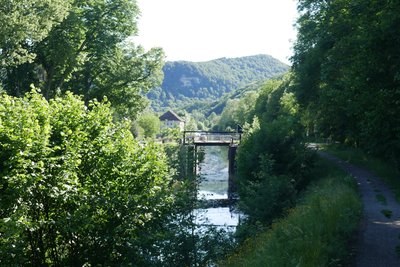
Écluse du canal du Rhône au Rhin à Baume-les-Dames - Amis saint Colomban HistoricalThe Rhone-Rhine canal at Baume-les-Dames
The idea of linking the Rhone basin to the Rhine basin by waterways is an old one since Colbert and Vauban had mentioned it under Louis XIV after the annexation of Franche-Comté and Alsace, but it was in the 18th century that the project took shape.
The Rhone-Rhine Canal is a French canal linking the Saône, a navigable tributary of the Rhone, to the Rhine through the Doubs valley and its extension into Upper Alsace as far as Niffer on the Rhine.
In the Doubs valley the river is partially channelled to avoid the damming of factories and mills using the driving force of the large flow of the Doubs.
Today river tourism has taken over from barges.
More information : Wikipedia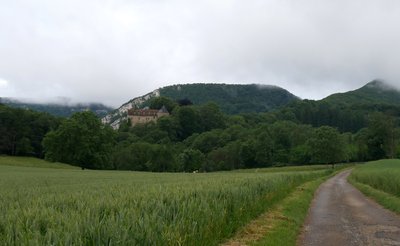
Vue du château de Roulans dans sa végétation depuis la Via Columbani - Amis saint Colomban HistoricalCastle of Roulans
The castle is private property and cannot be visited.
Roulans, in addition to the main village, has three hamlets including that of Petit Roulans where a second castle called "de Roulans" was built. In the XIVth century Roulans passed into the family of the "de Vienne". The castle is attested in the XIIth century. It is a site of barred spur dominating the plain. Almost completely demolished during the Revolution, the castle was then very much restored in a medieval spirit. At the end of the 19th century, a garden was laid out and decorated tiles from the 14th century were discovered.
The history of the site is linked to Jean de Vienne, Sire de Roulans, was born in 1341 in Dole. It has an extraordinary destiny. Coming from an illustrious family, a relative of the counts of Burgundy (Bourgogne Comté or Franche-Comté), he spent his childhood at the Château de Roulans where he became Lord on the death of his father.
In 1364, he was appointed constable and marshal to the King of France. He took part in 3 crusades during which he learned navigation and studied the notions that would make him a great sailor.
In 1373, at the age of 32, he was invested with the office of Admiral of France, an office which made him one of the most important figures in the kingdom. He carried the war on English soil by landing with his fleet (Battle of Rye near Dover) and set the coast on fire and blood, passing English soldiers with the edge of the sword, thus avenging the massacres perpetrated by the English in Calais.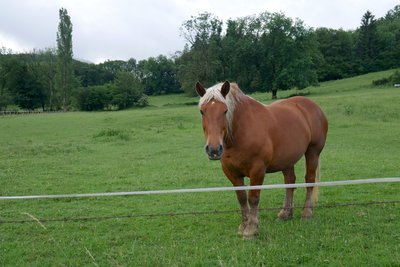
Robuste et élégant avec ses gros sabots couverts de poils. - Amis saint Colomban PanoramicThe Comtois horse
At the bend of a meadow you will discover the robust Comtois horse.
The Comtois is a breed of medium sized draft horses, specific to the Franche-Comté region. Of Germanic and perhaps Burgundian origin, it is mainly present in France and Switzerland. A famous battle horse under the Ancien Régime, the Comtois is the first example of a flourishing breeding of a heavy draught horse in France. It was decimated during the Napoleonic Wars and went through a period of decline in the 19th century, when it was confused, under the name of Jura horse, with the future Swiss Franches-Montagnes horse. Its breeding was revived at the beginning of the 20th century on the French side, it is known as the "Maîchard" horse of the Haut-Doubs plateaus.
More information on the site of the Comtois horse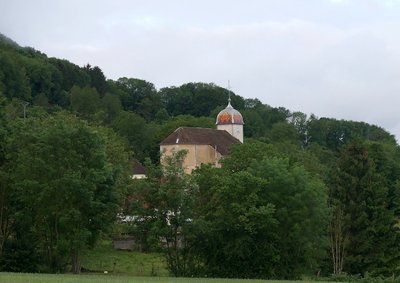
Vue de l’église Saint-Michel de Roulans depuis la Via Columbani - Amis saint Colomban TouristSaint-Michel church in Roulans
The church was built in the 18th century. It was rebuilt in 1846 with a beautiful Comtois bell tower.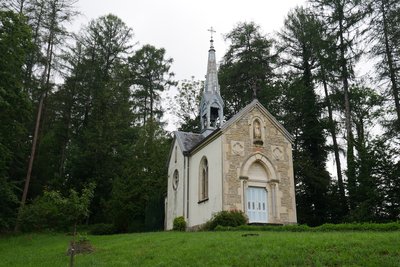
Chapelle Notre-Dame à Deluz - Amis saint Colomban TouristChapel of Notre-Dame in Deluz
Situated on the Via Columbani it deserves a break to admire the Doubs valley.
During the war of 1870, the parish priest of Deluz had made a vow that if all of Deluz's fighters returned, he would have a chapel built. The chapel was therefore erected by the inhabitants in 1873-74 on the hill overlooking the village. The Chapel Notre-Dame de Montoille was restored in 1970. A pilgrimage takes place there every year on the second Sunday of July.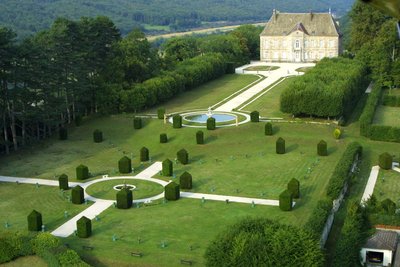
Vue aérienne du Château de Vaire-Arcier - Site internet du château de Vaire HistoricalCastle of Vaire-Arcier or Vaire-le-Grand
Description
In front of the church of Saint-Martin de Baume-les-Dames, turn left, rue R. Boiteux, right, rue du Bief Solaud, left, rue des Armuriers, right, rue Cizole, right, rue Faivre d'Esnans, cross rue de Verdun, rue du stade, right, promenade du Breuil after the supermarket, left, rue du 4ème Spahis, right at the roundabout and cross the Doubs:
- After the bridge over the Doubs, turn right onto the path between the river and the canal. Follow this pleasant path to a bridge over the canal at the Grange Vuillotey. Cross the bridge and enter the hamlet: turn right onto the road and then left after about ten metres to join the path which climbs up the south bank overhanging the Doubs.
- Continue along the path on the right to go down to Ougney-le-Bas, cross the Doubs, enter the village, turn right into Rue du Pont, turn left under the railway line and continue to the right on the D277a; then take the path on the left towards the west.
- Stay on the heights of the valley, right on the tarmac road and first path on the left on the plateau, chemin de Roulans, rue des Oches, right, rue des Vergers, left, rue des Artisans, first path on the left towards Notre-Dame d'Aigremont, go round the Rochers du Château Loriot on the right, go down towards Deluz
- Turn right into Grand-Rue, right into rue des Longeaux, left into rue du Dispensaire, right into 44 rue du Tatre, go up to the chapel of the Virgin, path on the right of the chapel.
- Crossroads with D426, take the dirt track on the left in the wood. Stay on the main path with the red and white markers
- Rue des Vignes in Vaire-le-Petit, on the left cross the Doubs you arrive in Vaire-le-Grand, rue du Centre, on the left, rue de l'Eglise.
- Departure : Saint Martin's Church, Place Saint-Martin, 25 110 Baume-les-Dames
- Arrival : Saint-Pierre and Saint-Paul Church, 20 rue de l'Église, 25 220 Vaire-le-Grand
- Towns crossed : Bourgogne-Franche-Comté
Altimetric profile
Transport
Report a problem or an error
If you have found an error on this page or if you have noticed any problems during your hike, please report them to us here:





